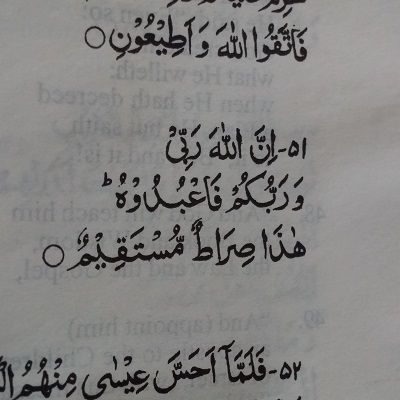Project Prayer: Ramadan 2017
Day 4: Islam 101 – Revelations: the Qur’an and other writings
By Jordan Rowley, spiritual coordinator, Climbing For Christ

Surah 3:51 in the Qur’an reads: “‘It is God who is my Lord and your Lord; then worship Him. This is a way that is straight.’” (Photo by Gary Fallesen)
Central to Islam is the message that the Prophet Muhammad received from his god, Allah. This message is known as the Qur’an – the holy book of Islam. It’s a revelation commonly taught to have been delivered to Muhammad through the angel Gabriel over a period of 23 years.
The Qur’an, meaning “the reading” in Arabic, is broken up into 114 surahs. All together these surahs (or chapters) are roughly the length of four-fifths of Christianity’s holy writing, our New Testament. In fact, the Qur’an itself favorably describes the New Testament/Gospel (Injil) along with other holy writings like the Torah (Taurat), Psalms and some other Old Testament writings (Zabur).
That said, however, it’s commonly taught that the New and Old Testaments, although pure in their original state, have been corrupted over the centuries and are therefore unreliable.
The Qur’an then is the only inspired book believed to have been perfectly preserved from the day it was originally written. In addition, the Hadith, a collection of sayings and deeds of the Prophet Muhammad, is ranked second to the Qur’an in the heart of Muslims. Detailing much of the life and legend of Muhammad, the Hadith is considered to be a practical and instructive application of the principles found in the Qur’an. In other words, the Hadith contains the inspired truths of Allah communicated through the life and words of his prophet, while the Qur’an is thought to contain the exact words of Allah himself.
Definitions:
- Qur’an – Islam’s holy book delivered to Muhammad through the angel Gabriel.
- Surah – One of the Qur’an 114 chapters.
- Hadith – Words and deeds of the Prophet Muhammad, helping to define the Qur’an.
- Injil – The Gospel or New Testament.
- Taurat – The Torah of Moses.
- Zabur – The Psalms of David and other Old Testament writings.
As devout and sincere as followers of Islam may be in their reading and reverence of it, the fact is the Qur’an is not an inspired book. It was not delivered by God or the angel Gabriel. It is not the final word from God to His people – but a false word.
In Galatians 1:8, the Apostle Paul sternly warned, “but even if we, or an angel from heaven, preach any other gospel to you than what we have preached to you, let him be accursed.”
Clearly, the Prophet Muhammad came, by revelation from an “angel from heaven,” preaching “another gospel,” that has deceived billions.
So what can we do?!
Later on in our Ramadan series, we’ll be looking further into the Qur’an and how it can be used to build a bridge for a Muslim to come to faith in Jesus, or Isa, as He’s referred to in the Qur’an. The Qur’an doesn’t deny, but rather confirms the authenticity of the Injil, along with several truths about Jesus Himself. This offers us great opportunity and great hope in believing that many Muslims can be reached with the Good News.
Let’s pray now for our Muslim neighbors from around the world:
-
Pray for Muslims who are seeking. May God send His servants to share His Gospel message with them. May the Injil be used in mighty ways to move hearts to pursue Jesus.
-
Pray for followers of Islam to be stirred by the few bread crumbs of truth found within the Qur’an. May God deliver them from the darkness of Islam to the Light of Jesus and His truth!
The Word
“For I am not ashamed of the gospel of Christ, for it is the power of God to salvation for everyone who believes, for the Jew first and also for the Greek.” – Romans 1:16 (NKJV)
The Series:
2852